中考专区二轮专题---时态复习
图片预览

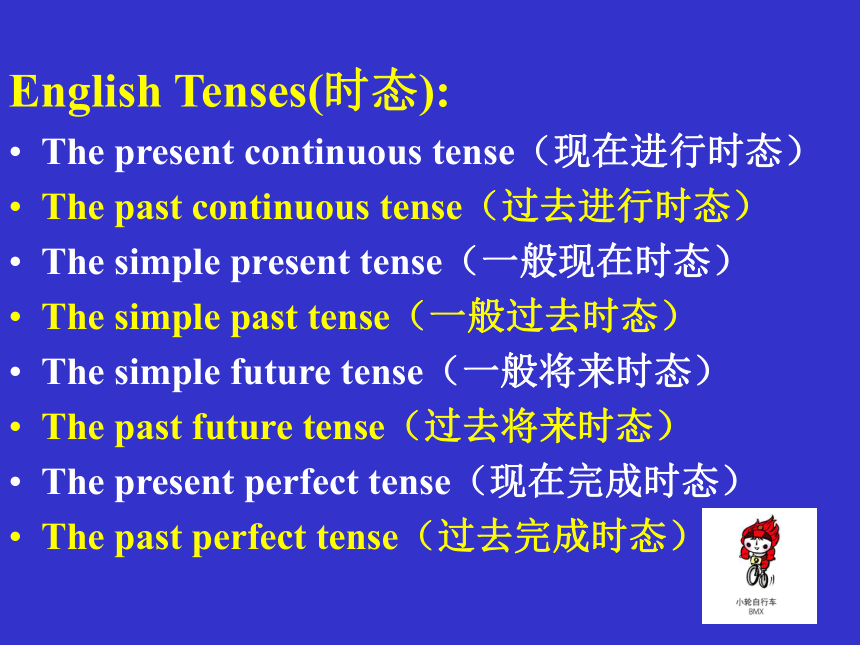
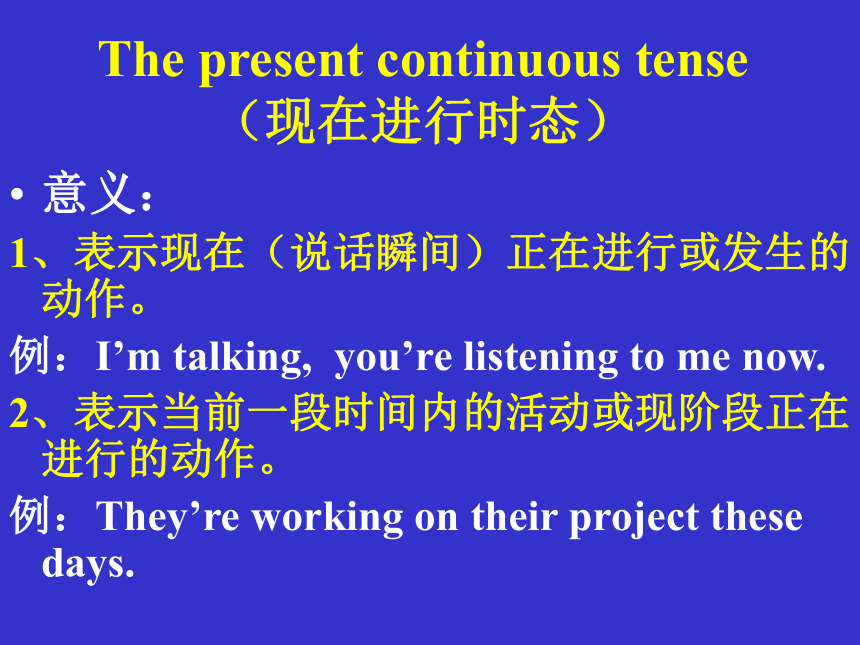
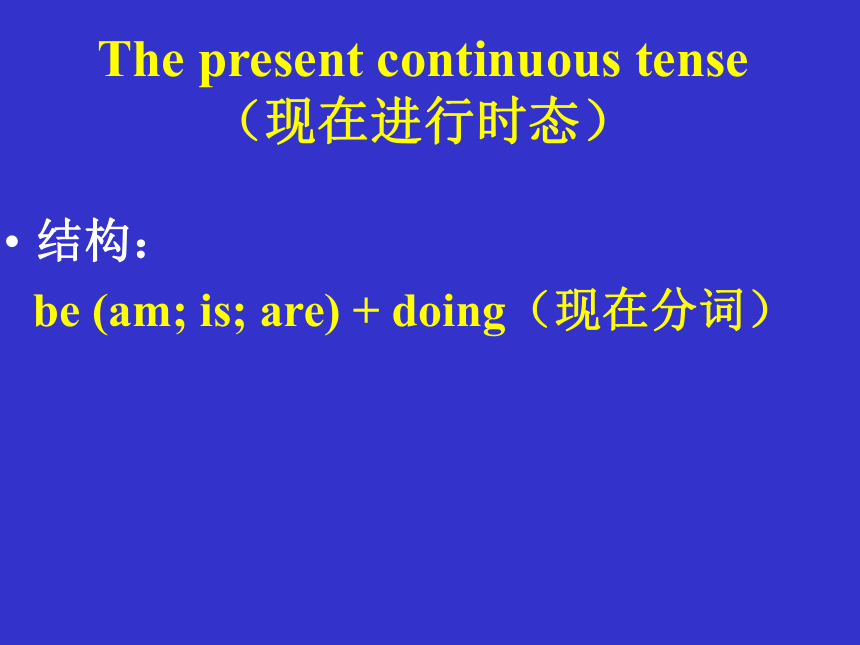
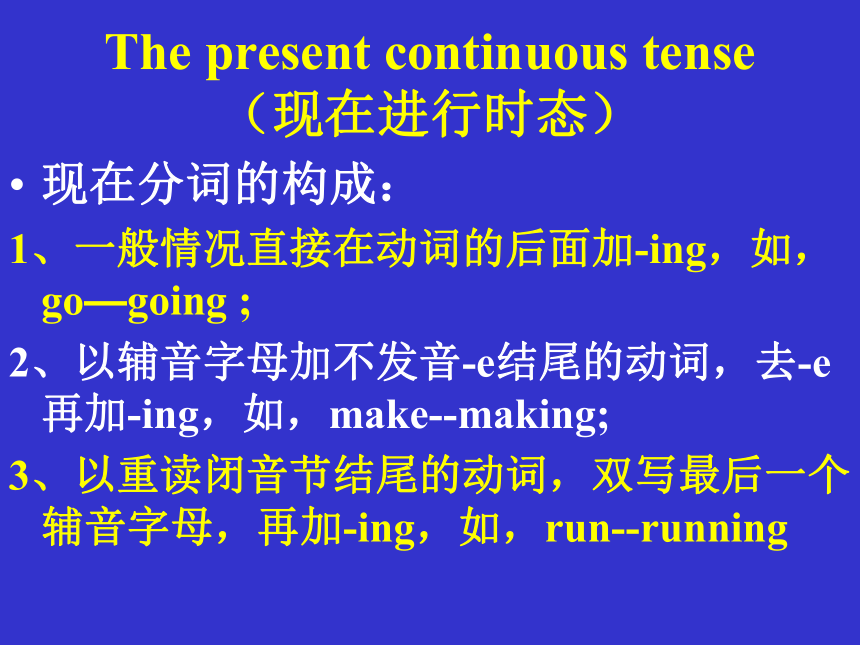
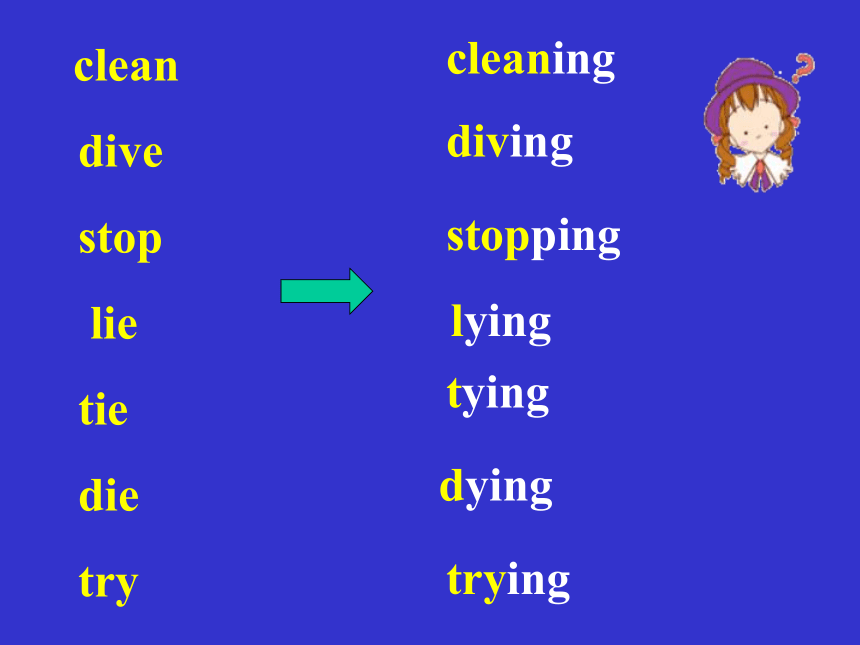
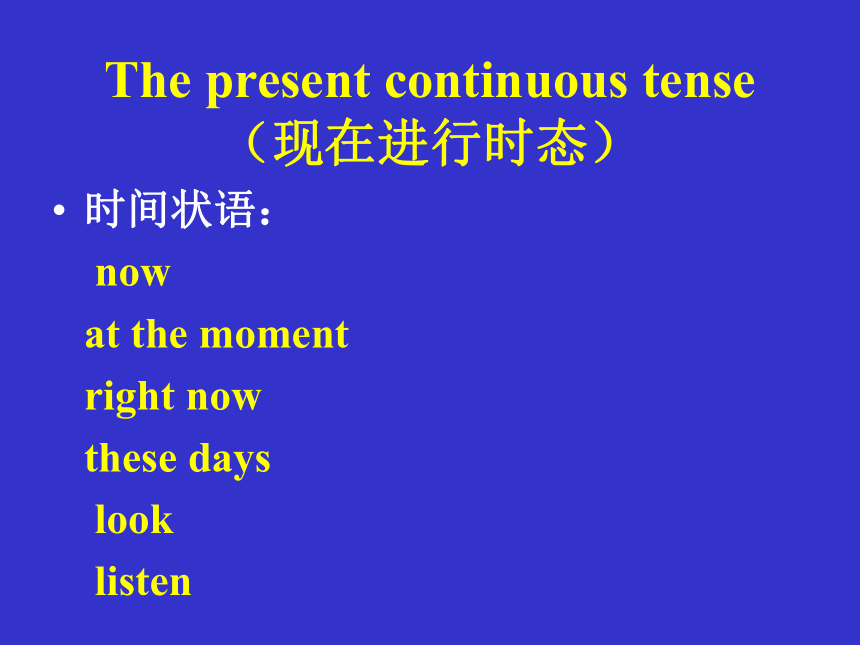


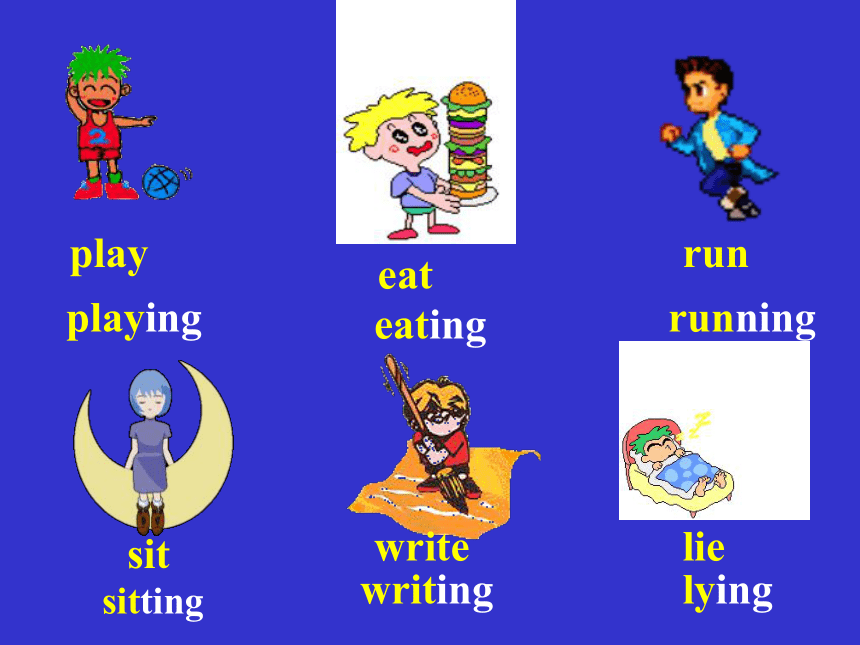
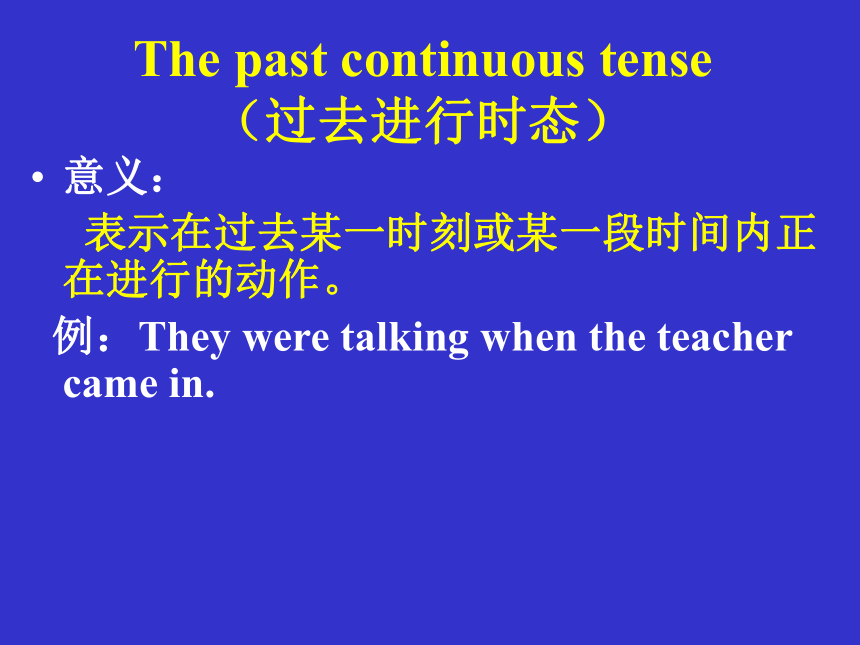
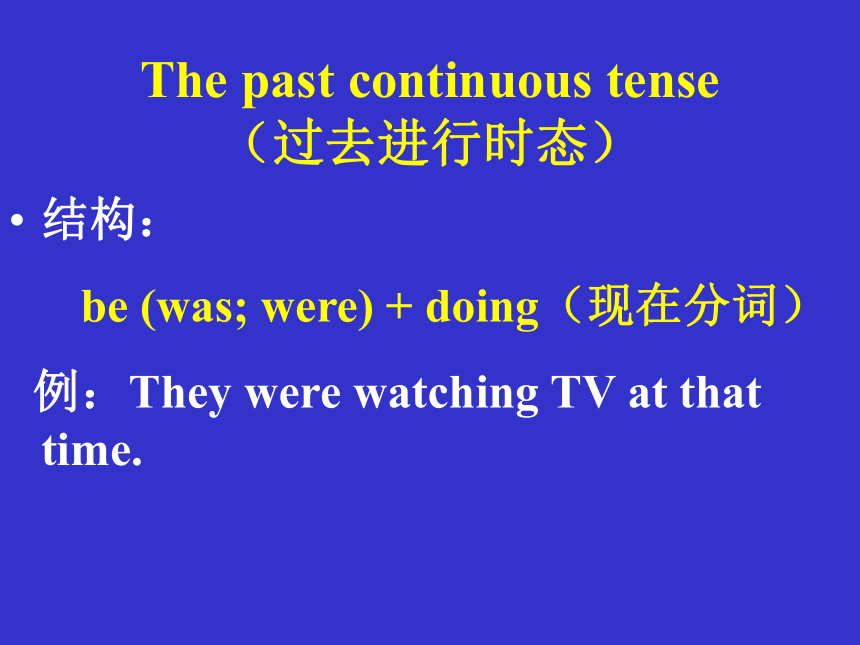
文档简介
课件103张PPT。Let’s enjoy English! Lucky Middle School
王凌凌English Tenses(时态):
The present continuous tense(现在进行时态)
The past continuous tense(过去进行时态)
The simple present tense(一般现在时态)
The simple past tense(一般过去时态)
The simple future tense(一般将来时态)
The past future tense(过去将来时态)
The present perfect tense(现在完成时态)
The past perfect tense(过去完成时态)The present continuous tense(现在进行时态)意义:
1、表示现在(说话瞬间)正在进行或发生的动作。
例:I’m talking, you’re listening to me now.
2、表示当前一段时间内的活动或现阶段正在进行的动作。
例:They’re working on their project these days.The present continuous tense(现在进行时态)结构:
be (am; is; are) + doing(现在分词)
The present continuous tense(现在进行时态)现在分词的构成:
1、一般情况直接在动词的后面加-ing,如,go—going ;
2、以辅音字母加不发音-e结尾的动词,去-e再加-ing,如,make--making;
3、以重读闭音节结尾的动词,双写最后一个辅音字母,再加-ing,如,run--running clean
dive
stop
lie
tie
die
try cleaning
divingstopping
lying
tying
dying
trying
The present continuous tense(现在进行时态)时间状语:
now
at the moment
right now
these days
look
listenYao Ming A famous basketball player Look!
Yao Ming is trying to throw the basketball into the basket
now.
(at the moment)
(right now)
play playing eat eating run running sit sitting write writing lie lyingThe past continuous tense (过去进行时态)意义:
表示在过去某一时刻或某一段时间内正在进行的动作。
例:They were talking when the teacher came in.
The past continuous tense (过去进行时态)结构:
be (was; were) + doing(现在分词)
例:They were watching TV at that time.
The past continuous tense (过去进行时态)时间状语:
at eight yesterday
at nine last night
at that time
at this time yesterday
when he came in…
while… --What was the boy doing at this time yesterday?
( when I saw him last time)
--He was fishing. climb/ climbing work/ working draw/ drawing dance/ dancing cook/ cooking sing singing Can you do this?
A dog _____________ after a cat now.
The teacher ___________the student a question
when the bell __________.
3.Look! A little girl __________on the ground.
She __________loudly.
4. Our country ___________ stronger and stronger.
5.While I ____________ a newspaper,
my daughter____________ with a toy plane. is running was asking rang is lying is crying is becoming was reading was playingThe simple present tense (一般现在时态)意义:
1、表示经常的或习惯性的动作;
例:I go to bed at ten o’clock every night.
2、表示客观事实或普遍真理;
例:The sun rises in the east.
3、在条件、时间或让步状语从句中代替一般将来时态。
例:If it is fine tomorrow, we will go for a picnic.The simple present tense (一般现在时态)结构:
1、主语是第一人称I 或we,第二人称you,第三人称复数they时,谓语动词用动词原形;作否定句、疑问句时,用助动词 do 。否定式do not简写为don’t。
例:They don’t go back home after school, they play basketball .
2、 主语是第三人称单数时,谓语动词变为第三人称单数;作否定句、疑问句时,用助动词 does 。否定式does not简写为doesn’t。
例:He speaks English, he doesn’t speak Japanese.
The simple present tense (一般现在时态)动词第三人称单数的构成:
1、一般情况在动词后直接加-s, 如,like—likes ;
2、以s, sh, ch, x, o结尾的动词,词尾加-es, 如,go—goes, watch—watches;
3、以辅音字母加-y结尾的动词,变-y为-i再加-es,如,carry--carries;
4、have的第三人称单数是has。 say
play
take
study
teach
stop
have
says plays takes
studies teaches stops has The simple present tense (一般现在时态)时间状语:
always often usually sometimes at times
once/ twice a week/ month/ year
every day/ month/ year/ morning/ night
in the morning/ afternoon/ evening
on weekdays/ weekends
The simple present tense (一般现在时态)Models:
1.Tom usually ______(help) his mum do the housework on Sundays.
2. Tom _______ usually _____ (not help) his mum do the housework on Sundays.
helps doesn’t helpThe simple present tense (一般现在时态)Models:
Tom usually helps his mum do the housework on Sundays. What does Tom usually do on Sundays?The simple present tense (一般现在时态)Models:
Tom usually helps his mum do the housework on Sundays.
What does Tom usually help his mum do on Sundays?
The simple present tense (一般现在时态)Models:
Tom usually helps his mum do the housework on Sundays.Who/ Whom does Tom usually help do the housework on Sundays?The simple present tense (一般现在时态)Models:
Tom usually helps his mum do the housework on Sundays.Who usually helps his mum do the housework on Sundays?The simple present tense (一般现在时态)Models:
Tom usually helps his mum do the housework on Sundays.
When does Tom usually help his mum do the housework?The simple past tense (一般过去时态)意义:
1、表示过去某个时间发生的动作或存在的状态;
例:We went to the Great Wall last Sunday.
2、表示过去经常或反复发生的动作(可以和often,always等表示频率的时间副词连用)。
例:My grandma often took a walk after supper the year before last. The simple past tense (一般过去时态)结构:
1、 谓语动词变为一般过去式
2、做否定句或疑问句时用助动词did
3、 did not简写为didn’t
4、be的过去式是was, were。否定式was not简写为wasn’t; were not简写为weren’t。
例:She didn’t win the gold medal in the Olympics, she won the bronze medal.
I called you this morning, but you were not in.The simple past tense (一般过去时态)动词一般过去式的构成:
1、一般情况在动词后直接加-ed或-d, 如,like—liked, wish--wished ;
2、以辅音字母加-y结尾的动词,变-y为-i再加-ed,如,carry—carried, cry--cried;
3 、以重读闭音节结尾的动词,双写最后一个辅音字母,再加-ed, 如,stop--stopped;
4、不规则变化,如,run—ran, swim--swam。 play
say
prepare
study
teach
plop
have
saidplayed preparedstudied
taught plopped hadThe simple past tense (一般过去时态)时间状语:
yesterday
the day before yesterday
yesterday morning/ afternoon/ evening
last night/ week/ month/ year/ Sunday
three days ago
a moment ago = just now
in 1998
when he was ten/ a childThe simple past tense (一般过去时态)Models:
He _____(do) his homework after supper yesterday evening.
He _________ (not do) his homework after supper yesterday evening.
_____ he _____ his homework after supper yesterday evening? diddidn’t do
Did doThe simple past tense (一般过去时态)Models:
He did his homework after supper yesterday evening.What did he do after supper yesterday evening?The simple past tense (一般过去时态)Models:
He did his homework after supper yesterday evening.When did he do his homework?Can you choose the best answer?If it ________ rain, I’ll go.
A. doesn’t B. won’t
C. don’t D. isn’t (2005年 · 北京)
If he _____ here tomorrow, I’ll meet him.
A. comes B. will come
C. came (2005年 · 河北模拟) A.A.Can you choose the best answer?I was drawing a horse _____the teacher came in.
A. while B. as
C. when D. the moment (2005年 · 北京)
--What did the policeman say to you just now?
-- He asked_______the accident happened.
A. what was I doing B. what I was doing
C. what am I doing D. what I am doing
(2005年 · 北京朝阳)C.B.Can you choose the best answer?What ______ to her yesterday evening?
A. was happened B. happened
C. happening D. happen
(2005年 · 甘肃)
-- Did you see the traffic accident yesterday?
-- Yes. It happened when I _____ past the museum.
A. walk B. am walking
C. will walk D. was walking
(2005年 · 苏州)
B.D.Can you choose the best answer?Our geography teacher once told us that the earth _____ around the sun.
A. goes B. went
C. ran D. walk (2005年 · 锦州)
I’m sorry I can’t hear _____.
A. what saying he is
B. what he is saying
C. what is he saying (2005年 · 佛山)
A.B. gets / got washes /washed has /had goes/ went begins /began has / had plays /played comes /came goes /wentSee you next time!Let’s enjoy English! Lucky Middle School
王凌凌 English Tenses(时态):
The present continuous tense
(现在进行时态)
The past continuous tense
(过去进行时态)
The simple present tense
(一般现在时态)
The simple past tense
(一般过去时态)
What are you doing now?
What were you doing at this time yesterday?
What do you often do every day?
What did you do yesterday?What are they doing now? running
diving
cycling
swimmingplayingWhat were they doing when you saw them last time? running
diving
cycling
swimmingplayingWhat do the athletes often do?runs
dives
cycles
swimplaysWhat did the athletes do in the last Olympics?ran
dived
cycled
swam played--Today is a holiday.
What am I going to do this afternoon?--What did Ms Wang say just now?--I’m going to take my daughter to the zoo.--She said she was going to take her daughter to the zoo.
The Simple Future Tense (一般将来时态) The Past Future Tense (过去将来时态)The Simple Future Tense (一般将来时态)意义:
1、表示将来某个时间发生的动作或存在的状态。
例:Jenny will go to her grandparents’ home tonight. Her cousins will be there, too.
2、表示将来经常或反复发生的动作。
例:Ms Wang will teach you English from now on. 3、表示打算、计划、决定要做某事
例: We are going to study chemistry next term.The Simple Future Tense (一般将来时态)结构:
1、will/ shall + do 将要
例:The radio says it will rain tomorrow.
2、be (am, is, are) going to + do 打算,准备
例: Look at the dark clouds! It’s going to rain!
3、be about to + do 即将
例: It’s about to rain! Let’s take a taxi home!
4、come, go, leave, arrive等动词通常用现在进行时表示“即将发生的将来”。
例:My uncle is leaving for Beijing on business soon.The Simple Future Tense (一般将来时态)Models:
I/ We will/shall have a meeting next week.
I/ We won’t/ shan’t have a meeting next week.Will you have a meeting next week?
Yes, I/ we will. No, I/ we won’t.The Simple Future Tense (一般将来时态)Models:
例:They are going to write a report about pollution tonight.
They aren’t going to write a report about pollution tonight.
Are they going to write a report about pollution tonight?The Simple Future Tense (一般将来时态)
They are going to write a report about pollution tonight.
What are they going to do tonight?The Simple Future Tense (一般将来时态)
They are going to write a report about pollution tonight.
When are they going to write a report about pollution?The Simple Future Tense (一般将来时态)Models:
Hurry up! The plane is about to take off!
The Simple Future Tense (一般将来时态)结构:
4、come, go, leave, arrive, fly等动词通常用现在进行时表示“即将发生的将来”。
例:Who is coming to your party this evening?
-- Where are you going?
-- I’m going shopping with mum.
The Simple Future Tense (一般将来时态)时间状语:
tomorrow
the day after tomorrow
next week/ month/ year/ time
from now on
soon
some/ one day
this Sunday/ afternoon tonight
in + 一段时间 (in three weeks’ time)
How soon…?The film will begin in 10 minutes’ time.How soon will the film begin?The Simple Future Tense (一般将来时态) will 和shall 的其它用法:
Shall I ...?和Shall we...? 常用来征求对方意见。
Will you...?表示客气的邀请或请求。例: Shall I put it here? Shall we go for a swim?
Will you please turn down the radio?
play eat run sit write lieThe Past Future Tense (过去将来时态)意义:
表示从过去某时看来,将要发生的动作或存在的状态,常用于宾语从句中。
例:She said that she would meet us at the school gate.
He told me that he would tell us something about his trip to England.The Past Future Tense (过去将来时态)结构:
1、would / should + do
例: Judy was fifteen. In two years, she would be seventeen.
2、 was(were) going to + do
例: He said that they were going to set up a hospital there. 3、was (were) about to + do
例:I was just about to go out when the telephone rang.4、come, go, leave, start等少数动词的过去进行时也可表示过去将要发生的动作。
例: Jordan said that he was leaving for Africa in a few days. climb work draw dance cook singPlease try these exercises!He _________ (not go) home until he _______ (finish) his work tonight.
What _____ the weather _____ (be) like tomorrow?
She said she _____________ (study) physics the next term.
They hoped they ___________ (have) a good harvest the following year.
If I had wings, I __________ (fly) freely like a bird in the blue sky.
won’t go finishes will be would study would have would fly6. If it _______ tomorrow, we ________ trees in the park. A.won’t rain… will plant
B. won’t rain… don’t plant
C. doesn’t rain…will plant
7. Jim _______ us an e-mail as soon as he _______London.
A. will send…gets B. sends… arrives in C. will send…reaches
CC8. --______ you please not make so much noise?
-- OK. I ______. A. Will… wouldn’t B. Will…will
C. Would… won’t
9. The radio says there ______ rain tonight, it _____ sunny tomorrow morning. A. will be…will be B. will have …is C. is going to have…is
CA10. I don’t know if it _____ tomorrow. If it _______, I will stay at home.
A. will rain; rains
B. rains; will rain
C. will rain; will rain (2005年 · 哈尔滨)
11. -- Do you know if he ______ to play basketball with us?
-- I think he will come if he____ free tomorrow.
A. comes; is B. comes; will be
C. will come; is D. will come; will be
(2005年 · 山东模拟)
A.C. 1. Jim _______ goes swimming on Sunday
afternoon.
A. often B. always C. usually D. sometime
2. He went swimming ________.
A. last Sunday afternoon.
B. every Sunday afternoon
C. three days ago
D. just now DsBlast Which is not right? Please correct it. If it is fine tomorrow, I will go to plant trees.
Because Tree-planting Day has already come! March 12th is Tree-planting Day. --What have you already done to protect the environment of our hometown?
--I have done….
have planted trees in our school have written a report about the pollution of our city to the TV station.--What had you done for the environment by last year?-- We had done a lot to make ourby the end of last year?environment better and better.The present perfect tense (现在完成时态) The past perfect tense (过去完成时态)The Present Perfect Tense意义和用法:
1、表示过去发生或已完成的某个动作对现在产生的影响或结果,强调的是这个影响或结果,常同already, just, yet等状语连用。
例:I have just turned off the light.
I have already read the book.
I haven’t finished my work yet.The Present Perfect Tense意义和用法:
2、表示开始于过去、持续到现在的动作或状态,常同表示包括现在在内的时间状语连用,如:today, now, this week, this morning, these days, this afternoon, recently, so far等;也同“for+时间段”或 “since+时间点”的状语连用。例:She has taught in the school for ten years.
I haven't eaten anything since breakfast.
We have been busy this morning.
The Present Perfect Tense意义和用法:
3、表示从过去某一时间到说话时这段时间中反复发生的动作或多次动作的总和,常同频度副词always, often, seldom, never等连用。
例: He has done a lot of work in the past two years.
I have never seen such a beautiful bird. have (has) been to和have( has) gone to
1、have (has) been to表示“曾去过”,指有过某种经历,可同often, never, ever, once, twice, many times等连用。
例:He has been to Shanghai many times. 2、 have(has) gone to 表示“已去了某地(不在此地)”。
例:Amy isn't in the classroom.
She has gone to the library.
非延续性动词和延续性动词
非延续性动词也叫瞬间动词,表示瞬间的、不能延续一段时间的动作,因此不能同表示一段时间的状语连用。如:buy,borrow,start,begin,leave等。 延续性动词则是表示动作能持续一段时间的动词。如:stay, work, wear, sleep, live, keep等。例:他来这里已经5天了。 He has come here for five days. (误) He has been here for five days. (正)Try to translate these sentences!1、他离开南京已经20年了。
2、她到达这里已经1个小时了。
He has left Nanjing for twenty years. (误)
He has been away from Nanjing for twenty years. (正)She has arrived here for an hour. (误) She has been here for an hour. (正) Try to translate these sentences!3、马丁患感冒已经3天了。
4、她生病已经一个星期了。
Martin has caught a cold for three days. (误)
Martin has had a cold for three days. (正) She has fallen ill for a week. (误) She has been ill for a week. (正) Try to translate these sentences!5、这本书我已经借了五天了。
6、他的哥哥已经参军很长时间了。
I have borrowed the book for five days. (误)
I have kept the book for five days. (正)His brother has joined the army for a long time. (误)????? His brother has been in the army for a long time. (正) Try to translate these sentences!7、会议已经开始半个小时了。
8、雷锋已经去世四十多年了。
The meeting has begun for half an hour. (误)
The meeting has been on for half an hour.(正)Lei Feng has died for more than forty years.(误)
Lei Feng has been dead for more than forty years.(正)
More exercises:
1. I ______ a bicycle the year before last . I ______ it for two years.
A. buy …bought B. bought… have bought
C. bought…have had
2. Jim _____ “Green China” Group ten years ago. He _____ in the group since ten years ago.
A. joined…has joined B. joined...has been
C. took part in…has been
CBMore Exercises:
3. – May I speak to Jim?
--Sorry , he ______ Japan. But he ______ in two weeks.
A. has gone to … will come back
B. has been to… will be backAThe Past Perfect Tense意义:
表示到过去某一时间之前已经完成或结束的动作或状态,也就是“过去的过去”。如图所示:
现在将来过去过去完成The Past Perfect Tense结构:
had + done (过去分词)The Past Perfect Tense用法:
1.过去完成时中的过去时间常用by和before引导的时间状语表示。
例:The children had all gone to bed by nine o'clock last night.
By the end of last month we had learnt 2,000 English words.
We had got everything ready before eight o'clock this morning.
The Past Perfect Tense用法:
2.过去时间可由when, before等引导的状语从句表示。
例:When I got to the cinema, the film had already begun.
She had taught here for ten years before she went abroad.
The Past Perfect Tense用法:
3.过去时间也可由上下文情景表示出来。 例:She looked rather pale. She had been ill for a week. We arrived at the school ten minutes late. The bus had broken down half way.
He didn't want to go to see the film because he had already seen it.The Past Perfect Tense用法:
4、用在she said, he asked, he knew等后面的宾语从句中 例:She said that they had known each other for thirty years. He asked who had taken his dictionary.
She knew she had made a serious mistake. He told me that he had studied a little French before he came to France.Do the exercises, please!I (read)ten English novels
so far.
2. By the end of last month I _________ (read)ten English novels.
3. She (make)much progress already.
4. She said that she (make)much progress since she came here already. have read had read has made had madeMore exercises!1. They ______all their money, so they have to walk home now. (2005年丰台区)
A. have spent B. spend
C. spent D. are spending
15. He kept looking at her, wondering whether he ______ her somewhere. ( 2005年青岛市)
A. looked for B. has seen
C. was looking for D. had seen
ADMore exercises!3. Jenny, with her parents, _____ her grandparents on Sundays. (2005年成都)
A. visits B. is visiting C. have visited
4. Jack has ________ to study hard to catch up with his classmates. (2005河北模拟)
A. said B. decided
C. give up D. decision
ABMore exercises!5. The worker has lived there _________twenty years ago. (2005河北模拟)
A. since B. for
C. before D. after
6. —Have you ____your ticket , sir?
—No, I’m still ___it. (2005深圳)
A. found; finding B. looked for ; looking for
C. found; looking for D. looked for ; finding A C More exercises!7. ---Is that Jack speaking?
---Sorry, he isn’t in right now. He ______ the cinema with his aunt. (2005年北京市)
A. has been to B. has gone to
C. have been to D. have gone to
8. --How many times______ you _____ America?
-- Twice. (2005河北模拟)
A.have… been to B.have… gone to C.have… gone D.have… been B A Last spring, Jim ______(go) to plant apple trees on the hills with his friends. It ______(be) cloudy that day. When they were planting trees, it _______(begin) to rain. Luckily, it ___________(not rain) for long. They ________(work) very hard. Jim had never planted trees before, so he ________(enjoy) it very much. He said he __________ (pick) apples when the apples were harvested. went was began didn’t rain worked enjoyed would pick Another story about Jim Where’s Jim now? He ____________(回去)to hometown with his parents for a holiday. He ______________ ( 离开)for two weeks. He __________(回来) to China next month.
His friends _____________(没收到……信) from him yet. They _______ (想念)him very much. They __________(发送) him an e-mail this evening. has gone back has been away will return haven’t heard miss will sendSee you next time!
王凌凌English Tenses(时态):
The present continuous tense(现在进行时态)
The past continuous tense(过去进行时态)
The simple present tense(一般现在时态)
The simple past tense(一般过去时态)
The simple future tense(一般将来时态)
The past future tense(过去将来时态)
The present perfect tense(现在完成时态)
The past perfect tense(过去完成时态)The present continuous tense(现在进行时态)意义:
1、表示现在(说话瞬间)正在进行或发生的动作。
例:I’m talking, you’re listening to me now.
2、表示当前一段时间内的活动或现阶段正在进行的动作。
例:They’re working on their project these days.The present continuous tense(现在进行时态)结构:
be (am; is; are) + doing(现在分词)
The present continuous tense(现在进行时态)现在分词的构成:
1、一般情况直接在动词的后面加-ing,如,go—going ;
2、以辅音字母加不发音-e结尾的动词,去-e再加-ing,如,make--making;
3、以重读闭音节结尾的动词,双写最后一个辅音字母,再加-ing,如,run--running clean
dive
stop
lie
tie
die
try cleaning
divingstopping
lying
tying
dying
trying
The present continuous tense(现在进行时态)时间状语:
now
at the moment
right now
these days
look
listenYao Ming A famous basketball player Look!
Yao Ming is trying to throw the basketball into the basket
now.
(at the moment)
(right now)
play playing eat eating run running sit sitting write writing lie lyingThe past continuous tense (过去进行时态)意义:
表示在过去某一时刻或某一段时间内正在进行的动作。
例:They were talking when the teacher came in.
The past continuous tense (过去进行时态)结构:
be (was; were) + doing(现在分词)
例:They were watching TV at that time.
The past continuous tense (过去进行时态)时间状语:
at eight yesterday
at nine last night
at that time
at this time yesterday
when he came in…
while… --What was the boy doing at this time yesterday?
( when I saw him last time)
--He was fishing. climb/ climbing work/ working draw/ drawing dance/ dancing cook/ cooking sing singing Can you do this?
A dog _____________ after a cat now.
The teacher ___________the student a question
when the bell __________.
3.Look! A little girl __________on the ground.
She __________loudly.
4. Our country ___________ stronger and stronger.
5.While I ____________ a newspaper,
my daughter____________ with a toy plane. is running was asking rang is lying is crying is becoming was reading was playingThe simple present tense (一般现在时态)意义:
1、表示经常的或习惯性的动作;
例:I go to bed at ten o’clock every night.
2、表示客观事实或普遍真理;
例:The sun rises in the east.
3、在条件、时间或让步状语从句中代替一般将来时态。
例:If it is fine tomorrow, we will go for a picnic.The simple present tense (一般现在时态)结构:
1、主语是第一人称I 或we,第二人称you,第三人称复数they时,谓语动词用动词原形;作否定句、疑问句时,用助动词 do 。否定式do not简写为don’t。
例:They don’t go back home after school, they play basketball .
2、 主语是第三人称单数时,谓语动词变为第三人称单数;作否定句、疑问句时,用助动词 does 。否定式does not简写为doesn’t。
例:He speaks English, he doesn’t speak Japanese.
The simple present tense (一般现在时态)动词第三人称单数的构成:
1、一般情况在动词后直接加-s, 如,like—likes ;
2、以s, sh, ch, x, o结尾的动词,词尾加-es, 如,go—goes, watch—watches;
3、以辅音字母加-y结尾的动词,变-y为-i再加-es,如,carry--carries;
4、have的第三人称单数是has。 say
play
take
study
teach
stop
have
says plays takes
studies teaches stops has The simple present tense (一般现在时态)时间状语:
always often usually sometimes at times
once/ twice a week/ month/ year
every day/ month/ year/ morning/ night
in the morning/ afternoon/ evening
on weekdays/ weekends
The simple present tense (一般现在时态)Models:
1.Tom usually ______(help) his mum do the housework on Sundays.
2. Tom _______ usually _____ (not help) his mum do the housework on Sundays.
helps doesn’t helpThe simple present tense (一般现在时态)Models:
Tom usually helps his mum do the housework on Sundays. What does Tom usually do on Sundays?The simple present tense (一般现在时态)Models:
Tom usually helps his mum do the housework on Sundays.
What does Tom usually help his mum do on Sundays?
The simple present tense (一般现在时态)Models:
Tom usually helps his mum do the housework on Sundays.Who/ Whom does Tom usually help do the housework on Sundays?The simple present tense (一般现在时态)Models:
Tom usually helps his mum do the housework on Sundays.Who usually helps his mum do the housework on Sundays?The simple present tense (一般现在时态)Models:
Tom usually helps his mum do the housework on Sundays.
When does Tom usually help his mum do the housework?The simple past tense (一般过去时态)意义:
1、表示过去某个时间发生的动作或存在的状态;
例:We went to the Great Wall last Sunday.
2、表示过去经常或反复发生的动作(可以和often,always等表示频率的时间副词连用)。
例:My grandma often took a walk after supper the year before last. The simple past tense (一般过去时态)结构:
1、 谓语动词变为一般过去式
2、做否定句或疑问句时用助动词did
3、 did not简写为didn’t
4、be的过去式是was, were。否定式was not简写为wasn’t; were not简写为weren’t。
例:She didn’t win the gold medal in the Olympics, she won the bronze medal.
I called you this morning, but you were not in.The simple past tense (一般过去时态)动词一般过去式的构成:
1、一般情况在动词后直接加-ed或-d, 如,like—liked, wish--wished ;
2、以辅音字母加-y结尾的动词,变-y为-i再加-ed,如,carry—carried, cry--cried;
3 、以重读闭音节结尾的动词,双写最后一个辅音字母,再加-ed, 如,stop--stopped;
4、不规则变化,如,run—ran, swim--swam。 play
say
prepare
study
teach
plop
have
saidplayed preparedstudied
taught plopped hadThe simple past tense (一般过去时态)时间状语:
yesterday
the day before yesterday
yesterday morning/ afternoon/ evening
last night/ week/ month/ year/ Sunday
three days ago
a moment ago = just now
in 1998
when he was ten/ a childThe simple past tense (一般过去时态)Models:
He _____(do) his homework after supper yesterday evening.
He _________ (not do) his homework after supper yesterday evening.
_____ he _____ his homework after supper yesterday evening? diddidn’t do
Did doThe simple past tense (一般过去时态)Models:
He did his homework after supper yesterday evening.What did he do after supper yesterday evening?The simple past tense (一般过去时态)Models:
He did his homework after supper yesterday evening.When did he do his homework?Can you choose the best answer?If it ________ rain, I’ll go.
A. doesn’t B. won’t
C. don’t D. isn’t (2005年 · 北京)
If he _____ here tomorrow, I’ll meet him.
A. comes B. will come
C. came (2005年 · 河北模拟) A.A.Can you choose the best answer?I was drawing a horse _____the teacher came in.
A. while B. as
C. when D. the moment (2005年 · 北京)
--What did the policeman say to you just now?
-- He asked_______the accident happened.
A. what was I doing B. what I was doing
C. what am I doing D. what I am doing
(2005年 · 北京朝阳)C.B.Can you choose the best answer?What ______ to her yesterday evening?
A. was happened B. happened
C. happening D. happen
(2005年 · 甘肃)
-- Did you see the traffic accident yesterday?
-- Yes. It happened when I _____ past the museum.
A. walk B. am walking
C. will walk D. was walking
(2005年 · 苏州)
B.D.Can you choose the best answer?Our geography teacher once told us that the earth _____ around the sun.
A. goes B. went
C. ran D. walk (2005年 · 锦州)
I’m sorry I can’t hear _____.
A. what saying he is
B. what he is saying
C. what is he saying (2005年 · 佛山)
A.B. gets / got washes /washed has /had goes/ went begins /began has / had plays /played comes /came goes /wentSee you next time!Let’s enjoy English! Lucky Middle School
王凌凌 English Tenses(时态):
The present continuous tense
(现在进行时态)
The past continuous tense
(过去进行时态)
The simple present tense
(一般现在时态)
The simple past tense
(一般过去时态)
What are you doing now?
What were you doing at this time yesterday?
What do you often do every day?
What did you do yesterday?What are they doing now? running
diving
cycling
swimmingplayingWhat were they doing when you saw them last time? running
diving
cycling
swimmingplayingWhat do the athletes often do?runs
dives
cycles
swimplaysWhat did the athletes do in the last Olympics?ran
dived
cycled
swam played--Today is a holiday.
What am I going to do this afternoon?--What did Ms Wang say just now?--I’m going to take my daughter to the zoo.--She said she was going to take her daughter to the zoo.
The Simple Future Tense (一般将来时态) The Past Future Tense (过去将来时态)The Simple Future Tense (一般将来时态)意义:
1、表示将来某个时间发生的动作或存在的状态。
例:Jenny will go to her grandparents’ home tonight. Her cousins will be there, too.
2、表示将来经常或反复发生的动作。
例:Ms Wang will teach you English from now on. 3、表示打算、计划、决定要做某事
例: We are going to study chemistry next term.The Simple Future Tense (一般将来时态)结构:
1、will/ shall + do 将要
例:The radio says it will rain tomorrow.
2、be (am, is, are) going to + do 打算,准备
例: Look at the dark clouds! It’s going to rain!
3、be about to + do 即将
例: It’s about to rain! Let’s take a taxi home!
4、come, go, leave, arrive等动词通常用现在进行时表示“即将发生的将来”。
例:My uncle is leaving for Beijing on business soon.The Simple Future Tense (一般将来时态)Models:
I/ We will/shall have a meeting next week.
I/ We won’t/ shan’t have a meeting next week.Will you have a meeting next week?
Yes, I/ we will. No, I/ we won’t.The Simple Future Tense (一般将来时态)Models:
例:They are going to write a report about pollution tonight.
They aren’t going to write a report about pollution tonight.
Are they going to write a report about pollution tonight?The Simple Future Tense (一般将来时态)
They are going to write a report about pollution tonight.
What are they going to do tonight?The Simple Future Tense (一般将来时态)
They are going to write a report about pollution tonight.
When are they going to write a report about pollution?The Simple Future Tense (一般将来时态)Models:
Hurry up! The plane is about to take off!
The Simple Future Tense (一般将来时态)结构:
4、come, go, leave, arrive, fly等动词通常用现在进行时表示“即将发生的将来”。
例:Who is coming to your party this evening?
-- Where are you going?
-- I’m going shopping with mum.
The Simple Future Tense (一般将来时态)时间状语:
tomorrow
the day after tomorrow
next week/ month/ year/ time
from now on
soon
some/ one day
this Sunday/ afternoon tonight
in + 一段时间 (in three weeks’ time)
How soon…?The film will begin in 10 minutes’ time.How soon will the film begin?The Simple Future Tense (一般将来时态) will 和shall 的其它用法:
Shall I ...?和Shall we...? 常用来征求对方意见。
Will you...?表示客气的邀请或请求。例: Shall I put it here? Shall we go for a swim?
Will you please turn down the radio?
play eat run sit write lieThe Past Future Tense (过去将来时态)意义:
表示从过去某时看来,将要发生的动作或存在的状态,常用于宾语从句中。
例:She said that she would meet us at the school gate.
He told me that he would tell us something about his trip to England.The Past Future Tense (过去将来时态)结构:
1、would / should + do
例: Judy was fifteen. In two years, she would be seventeen.
2、 was(were) going to + do
例: He said that they were going to set up a hospital there. 3、was (were) about to + do
例:I was just about to go out when the telephone rang.4、come, go, leave, start等少数动词的过去进行时也可表示过去将要发生的动作。
例: Jordan said that he was leaving for Africa in a few days. climb work draw dance cook singPlease try these exercises!He _________ (not go) home until he _______ (finish) his work tonight.
What _____ the weather _____ (be) like tomorrow?
She said she _____________ (study) physics the next term.
They hoped they ___________ (have) a good harvest the following year.
If I had wings, I __________ (fly) freely like a bird in the blue sky.
won’t go finishes will be would study would have would fly6. If it _______ tomorrow, we ________ trees in the park. A.won’t rain… will plant
B. won’t rain… don’t plant
C. doesn’t rain…will plant
7. Jim _______ us an e-mail as soon as he _______London.
A. will send…gets B. sends… arrives in C. will send…reaches
CC8. --______ you please not make so much noise?
-- OK. I ______. A. Will… wouldn’t B. Will…will
C. Would… won’t
9. The radio says there ______ rain tonight, it _____ sunny tomorrow morning. A. will be…will be B. will have …is C. is going to have…is
CA10. I don’t know if it _____ tomorrow. If it _______, I will stay at home.
A. will rain; rains
B. rains; will rain
C. will rain; will rain (2005年 · 哈尔滨)
11. -- Do you know if he ______ to play basketball with us?
-- I think he will come if he____ free tomorrow.
A. comes; is B. comes; will be
C. will come; is D. will come; will be
(2005年 · 山东模拟)
A.C. 1. Jim _______ goes swimming on Sunday
afternoon.
A. often B. always C. usually D. sometime
2. He went swimming ________.
A. last Sunday afternoon.
B. every Sunday afternoon
C. three days ago
D. just now DsBlast Which is not right? Please correct it. If it is fine tomorrow, I will go to plant trees.
Because Tree-planting Day has already come! March 12th is Tree-planting Day. --What have you already done to protect the environment of our hometown?
--I have done….
have planted trees in our school have written a report about the pollution of our city to the TV station.--What had you done for the environment by last year?-- We had done a lot to make ourby the end of last year?environment better and better.The present perfect tense (现在完成时态) The past perfect tense (过去完成时态)The Present Perfect Tense意义和用法:
1、表示过去发生或已完成的某个动作对现在产生的影响或结果,强调的是这个影响或结果,常同already, just, yet等状语连用。
例:I have just turned off the light.
I have already read the book.
I haven’t finished my work yet.The Present Perfect Tense意义和用法:
2、表示开始于过去、持续到现在的动作或状态,常同表示包括现在在内的时间状语连用,如:today, now, this week, this morning, these days, this afternoon, recently, so far等;也同“for+时间段”或 “since+时间点”的状语连用。例:She has taught in the school for ten years.
I haven't eaten anything since breakfast.
We have been busy this morning.
The Present Perfect Tense意义和用法:
3、表示从过去某一时间到说话时这段时间中反复发生的动作或多次动作的总和,常同频度副词always, often, seldom, never等连用。
例: He has done a lot of work in the past two years.
I have never seen such a beautiful bird. have (has) been to和have( has) gone to
1、have (has) been to表示“曾去过”,指有过某种经历,可同often, never, ever, once, twice, many times等连用。
例:He has been to Shanghai many times. 2、 have(has) gone to 表示“已去了某地(不在此地)”。
例:Amy isn't in the classroom.
She has gone to the library.
非延续性动词和延续性动词
非延续性动词也叫瞬间动词,表示瞬间的、不能延续一段时间的动作,因此不能同表示一段时间的状语连用。如:buy,borrow,start,begin,leave等。 延续性动词则是表示动作能持续一段时间的动词。如:stay, work, wear, sleep, live, keep等。例:他来这里已经5天了。 He has come here for five days. (误) He has been here for five days. (正)Try to translate these sentences!1、他离开南京已经20年了。
2、她到达这里已经1个小时了。
He has left Nanjing for twenty years. (误)
He has been away from Nanjing for twenty years. (正)She has arrived here for an hour. (误) She has been here for an hour. (正) Try to translate these sentences!3、马丁患感冒已经3天了。
4、她生病已经一个星期了。
Martin has caught a cold for three days. (误)
Martin has had a cold for three days. (正) She has fallen ill for a week. (误) She has been ill for a week. (正) Try to translate these sentences!5、这本书我已经借了五天了。
6、他的哥哥已经参军很长时间了。
I have borrowed the book for five days. (误)
I have kept the book for five days. (正)His brother has joined the army for a long time. (误)????? His brother has been in the army for a long time. (正) Try to translate these sentences!7、会议已经开始半个小时了。
8、雷锋已经去世四十多年了。
The meeting has begun for half an hour. (误)
The meeting has been on for half an hour.(正)Lei Feng has died for more than forty years.(误)
Lei Feng has been dead for more than forty years.(正)
More exercises:
1. I ______ a bicycle the year before last . I ______ it for two years.
A. buy …bought B. bought… have bought
C. bought…have had
2. Jim _____ “Green China” Group ten years ago. He _____ in the group since ten years ago.
A. joined…has joined B. joined...has been
C. took part in…has been
CBMore Exercises:
3. – May I speak to Jim?
--Sorry , he ______ Japan. But he ______ in two weeks.
A. has gone to … will come back
B. has been to… will be backAThe Past Perfect Tense意义:
表示到过去某一时间之前已经完成或结束的动作或状态,也就是“过去的过去”。如图所示:
现在将来过去过去完成The Past Perfect Tense结构:
had + done (过去分词)The Past Perfect Tense用法:
1.过去完成时中的过去时间常用by和before引导的时间状语表示。
例:The children had all gone to bed by nine o'clock last night.
By the end of last month we had learnt 2,000 English words.
We had got everything ready before eight o'clock this morning.
The Past Perfect Tense用法:
2.过去时间可由when, before等引导的状语从句表示。
例:When I got to the cinema, the film had already begun.
She had taught here for ten years before she went abroad.
The Past Perfect Tense用法:
3.过去时间也可由上下文情景表示出来。 例:She looked rather pale. She had been ill for a week. We arrived at the school ten minutes late. The bus had broken down half way.
He didn't want to go to see the film because he had already seen it.The Past Perfect Tense用法:
4、用在she said, he asked, he knew等后面的宾语从句中 例:She said that they had known each other for thirty years. He asked who had taken his dictionary.
She knew she had made a serious mistake. He told me that he had studied a little French before he came to France.Do the exercises, please!I (read)ten English novels
so far.
2. By the end of last month I _________ (read)ten English novels.
3. She (make)much progress already.
4. She said that she (make)much progress since she came here already. have read had read has made had madeMore exercises!1. They ______all their money, so they have to walk home now. (2005年丰台区)
A. have spent B. spend
C. spent D. are spending
15. He kept looking at her, wondering whether he ______ her somewhere. ( 2005年青岛市)
A. looked for B. has seen
C. was looking for D. had seen
ADMore exercises!3. Jenny, with her parents, _____ her grandparents on Sundays. (2005年成都)
A. visits B. is visiting C. have visited
4. Jack has ________ to study hard to catch up with his classmates. (2005河北模拟)
A. said B. decided
C. give up D. decision
ABMore exercises!5. The worker has lived there _________twenty years ago. (2005河北模拟)
A. since B. for
C. before D. after
6. —Have you ____your ticket , sir?
—No, I’m still ___it. (2005深圳)
A. found; finding B. looked for ; looking for
C. found; looking for D. looked for ; finding A C More exercises!7. ---Is that Jack speaking?
---Sorry, he isn’t in right now. He ______ the cinema with his aunt. (2005年北京市)
A. has been to B. has gone to
C. have been to D. have gone to
8. --How many times______ you _____ America?
-- Twice. (2005河北模拟)
A.have… been to B.have… gone to C.have… gone D.have… been B A Last spring, Jim ______(go) to plant apple trees on the hills with his friends. It ______(be) cloudy that day. When they were planting trees, it _______(begin) to rain. Luckily, it ___________(not rain) for long. They ________(work) very hard. Jim had never planted trees before, so he ________(enjoy) it very much. He said he __________ (pick) apples when the apples were harvested. went was began didn’t rain worked enjoyed would pick Another story about Jim Where’s Jim now? He ____________(回去)to hometown with his parents for a holiday. He ______________ ( 离开)for two weeks. He __________(回来) to China next month.
His friends _____________(没收到……信) from him yet. They _______ (想念)him very much. They __________(发送) him an e-mail this evening. has gone back has been away will return haven’t heard miss will sendSee you next time!
同课章节目录
- 词法
- 名词
- 动词和动词短语
- 动词语态
- 动词时态
- 助动词和情态动词
- 非谓语动词
- 冠词
- 代词
- 数词和量词
- 形容词副词及其比较等级
- 介词和介词短语
- 连词和感叹词
- 构词法
- 相似、相近词比较
- 句法
- 陈述句
- 一般疑问句和否定疑问句
- 特殊疑问句及选择疑问句
- 反意疑问句
- 存在句(There be句型)
- 宾语从句
- 定语从句
- 状语从句
- 主谓一致问题
- 简单句
- 并列句
- 复合句
- 主谓一致
- 主、表语从句
- 名词性从句
- 直接引语和间接引语
- 虚拟语气
- 感叹句
- 强调句
- 倒装句
- 祈使句
- 句子的成分
- 句子的分类
- 题型专区
- 单项选择部分
- 易错题
- 完形填空
- 阅读理解
- 词汇练习
- 听说训练
- 句型转换
- 补全对话
- 短文改错
- 翻译
- 书面表达
- 任务型阅读
- 语法填空
- 其他资料
